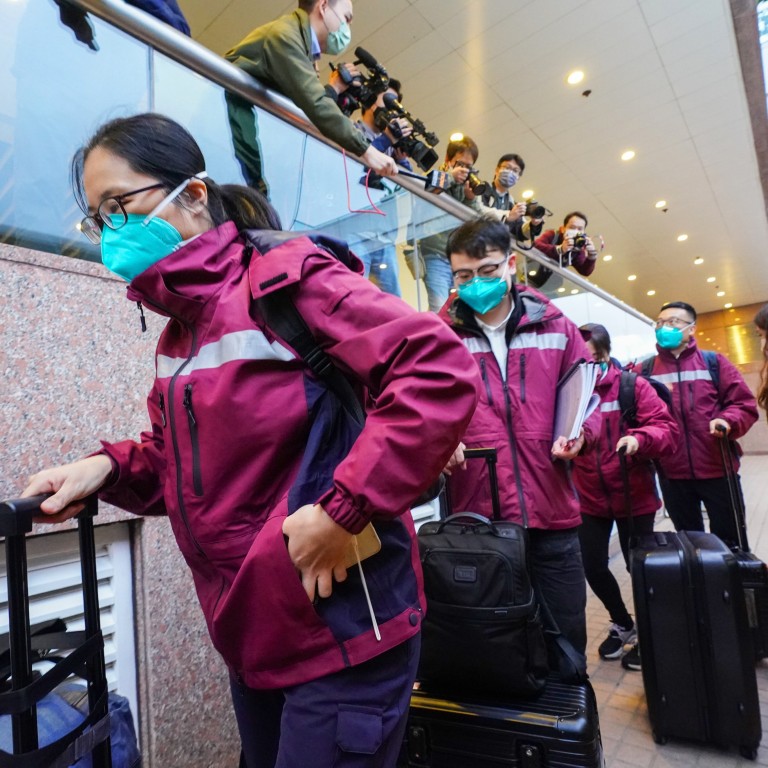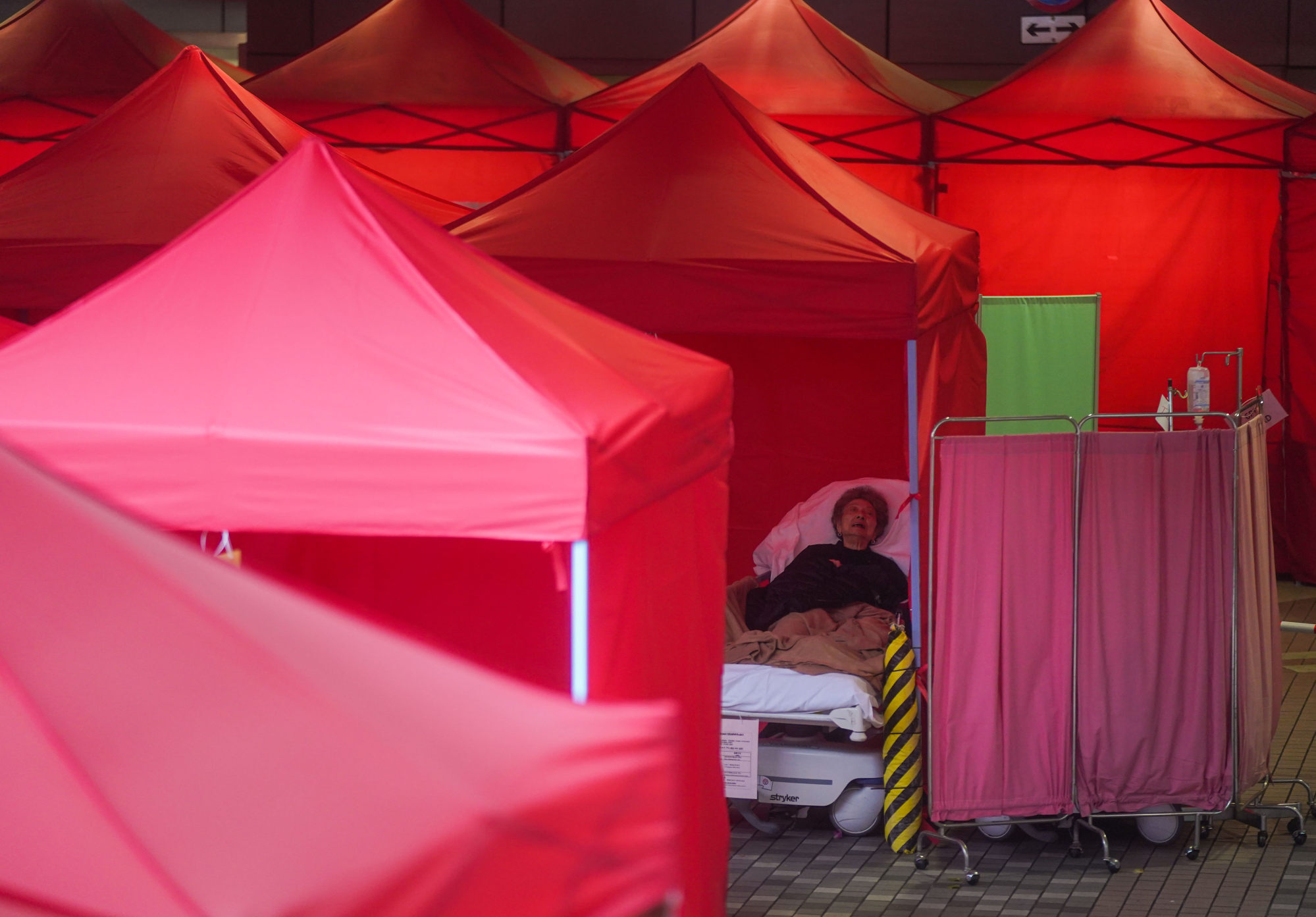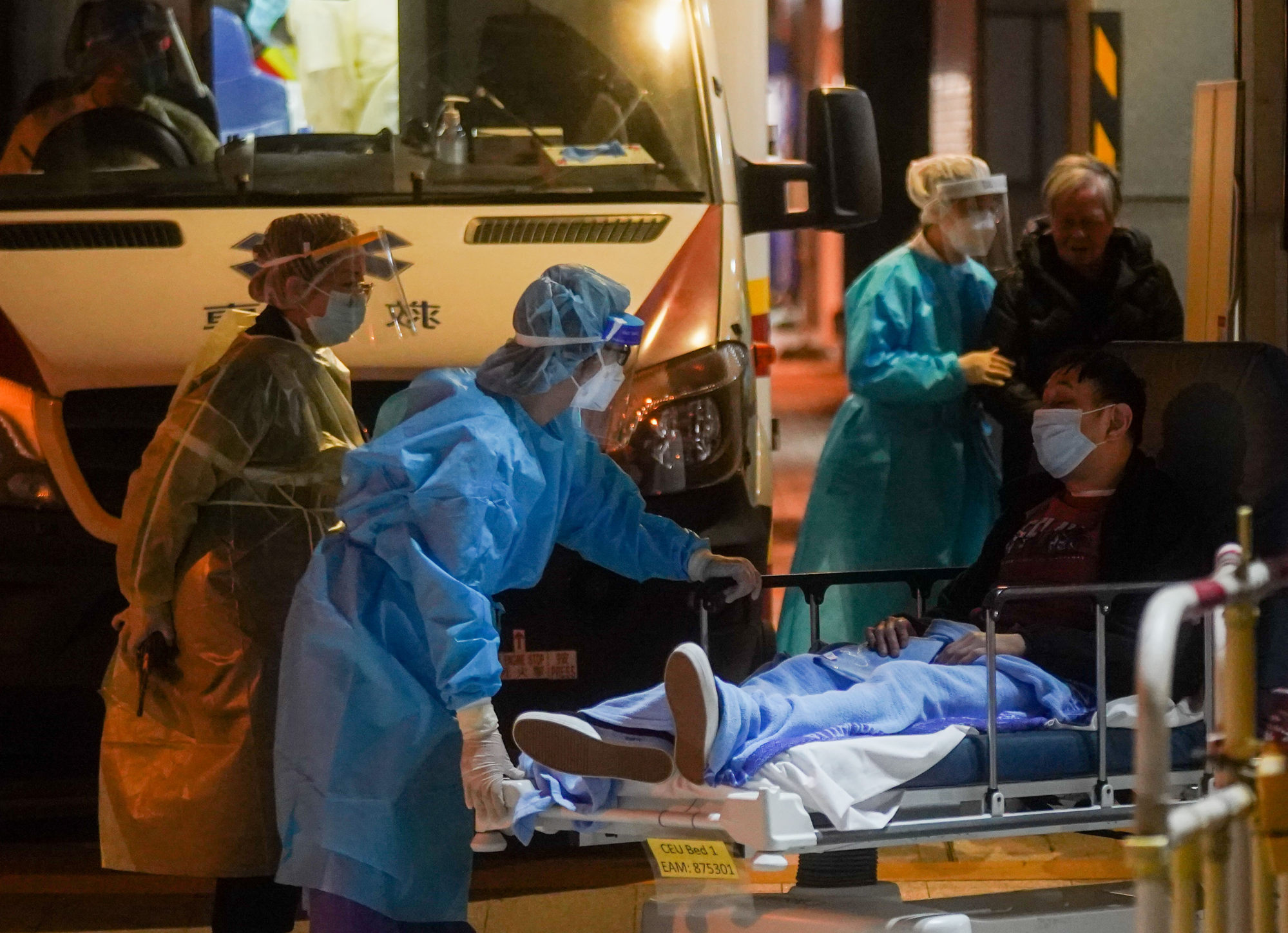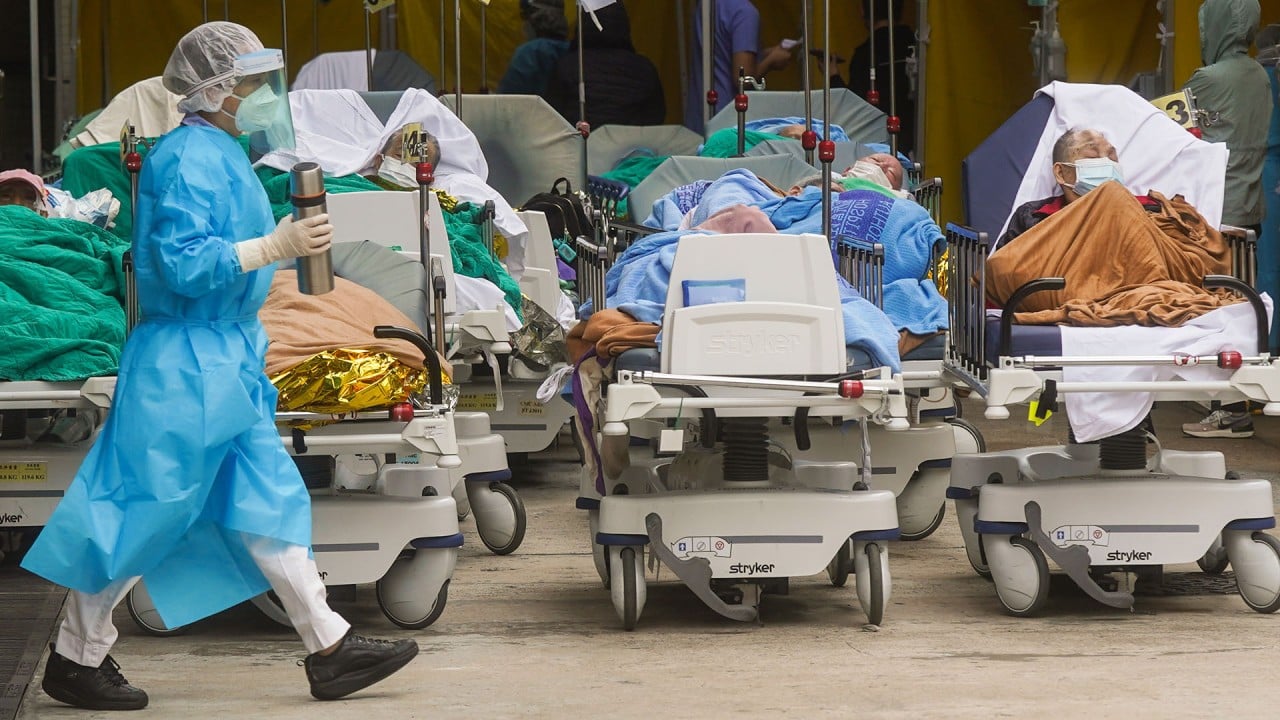
Coronavirus: top medical experts from mainland China begin reviewing Hong Kong’s efforts to combat pandemic surge
- After being greeted by city leader Carrie Lam, the epidemiologists visited the large-scale laboratory newly set up at the Ma On Shan Sports Centre
- Health authorities also ease discharge criteria for patients as more than 6,100 infections confirmed, setting fresh record
The city confirmed more than 6,100 infections, breaking another daily record, as the experts crossed the border into Hong Kong a day earlier than originally scheduled after Chinese President Xi Jinping instructed mainland officials to “fully support” the city in its struggle to contain a rapidly expanding outbreak.
The team entered Hong Kong via the Shenzhen Bay checkpoint at around 4pm, led by Kang Min, head of the infectious disease institute under the Guangdong Provincial Centre for Disease Control and Prevention.
The experts went to work the same evening, visiting the large-scale laboratory newly set up at the Ma On Shan Sports Centre, which began operating just the day before.
Two mobile testing vehicles, seen parked at the centre, were earlier referred to by Chief Executive Carrie Lam Cheng Yuet-ngor when she welcomed help from the mainland side and thanked Xi for attaching high importance to the city, as she received the experts at the checkpoint.
“We will definitely focus on the president’s instructions, taking all necessary measures and mobilising all resources. We won’t be distracted by anything else,” she said.
According to Lam, the team would meet local health authorities and experts to analyse the pandemic situation and how it would evolve, and share treatment methods including the use of traditional Chinese medicine.
Omicron has brought Hong Kong to its knees. How did it all go wrong?
Asked whether the government would conduct universal testing, Lam said Hong Kong had asked the central government to help boost the city’s screening capacity and it was working hard to raise it to 300,000 tests a day by the month’s end. She had also asked for mainland personnel to help collect test samples, she added.
“I believe the central government will positively respond to our requests. We are considering conducting a citywide universal test when we have this capacity,” Lam said.
Asked if a curfew or a total lockdown would be implemented instead of getting people to take tests in community centres, Lam said mainland experts had agreed that the former might not be suitable for Hong Kong’s particular circumstances.

The other members of the mainland team are: Chen Chun, director of the Guangzhou Centre for Disease Control and Prevention; Chen Xueqin, director of the Emergency Management Department of Zhongshan city’s Centre for Disease Control and Prevention; and Yang Taohui, who is acting as their secretary.
A day before their arrival a top Beijing official met representatives from several national agencies in Shenzhen on Wednesday to discuss the mainland’s response to the crisis and the main bottlenecks Hong Kong was facing.
“Who is in charge of what and talking to whom in the [Hong Kong] government was clearly defined at the meeting,” a source said.
Xia Baolong, director of the State Council’s Hong Kong and Macau Affairs Office, led the discussions, which did not include any officials from the city.
Hong Kong considering universal testing to combat fifth wave: Carrie Lam
Wang Hesheng, National Health Commission vice-minister and director of the National Administration for Disease Control and Prevention, also went to Shenzhen to coordinate medical resources in support of Hong Kong.
Strained by the unprecedented surge in cases, authorities have been forced to relax discharge criteria for patients to relieve pressure on the health care system.
Undersecretary for Food and Health Dr Chui Tak-yi revealed that patients could leave community isolation facilities if they tested negative seven days after their positive diagnosis, down from the previous requirement of 14 days, provided their living arrangements were suitable.
Residents who had been waiting for a hospital bed for at least 14 days but had already tested negative would not be required to be admitted, he added.
More than 22,000 residents who had tested positive were still waiting to be admitted to hospitals or isolation facilities, a check by the Post has found.
Nine of the 6,116 cases confirmed on Thursday were imported, while another 24 fatalities were reported, although nine of them occurred between Friday and Tuesday and only revealed now due to a backlog.
About 6,300 preliminary-positive cases were also reported. The city’s tally of confirmed cases stands at 37,071, with 259 related deaths.
Senior Beijing official orders mainland authorities to speed up assistance to Hong Kong
More than 10 patients, ranging in age from 28 to 97, were in critical condition, while more than 60 were listed as serious.
Dr Sara Ho Yuen-ha, a chief manager at the Hospital Authority, said the relaxed discharge arrangements would not apply to patients who lived with family members above 70 years old, pregnant women or other vulnerable people such as the immunocompromised or those undergoing chemotherapy.
She also revealed the authority would take over some indoor hospital areas such as conference rooms to avoid keeping patients outdoors.
Ho also urged care home operators to show greater compassion towards infected residents after some had refused to take back elderly patients following their release from hospital.
She also appealed to private doctors to help out at community isolation facilities, such as the one at Penny’s Bay, saying their assistance could free up public workers for hospitals.
“Hospitals are facing a great crisis … we can’t solve the problem alone,” Ho warned, adding 140 more hospital workers had been infected.

Public hospitals were now so swamped that one health care worker must tend to nearly 20 patients on average during night shifts, according to David Chan Kwok-shing, chairman of the labour union Hospital Authority Employees Alliance.
An ideal staff-to-patient ratio would be closer to one to four, he said, as he called on the authority to provide a comprehensive scheme for frontline workers to cope with the situation.
“Some said they have never faced such a bad situation,” he told a radio programme.
The growing caseloads have also led to a surge in demand for ambulance services to ferry patients to hospital.
“Under the grim pandemic situation, our ambulance service has faced a severe shortage of manpower,” Ng Hau-ming, assistant director for ambulances at the Fire Services Department, told the same radio programme.
Ng said it took much longer for each ambulance trip, as the vehicles had to be disinfected every time and staff had to wear protective suits. The influx of patients in hospitals had also forced ambulance staff to wait longer before their patients could be admitted.
Mainland health experts who have arrived in Hong Kong or are helping the fight
Wang Hesheng, director of the National Administration of Disease Prevention and Control; National Health Commission vice-minister
- A member of the central leading team during the 2020 Covid-19 outbreak in Wuhan
- Coordinated Shenzhen’s anti-pandemic help for Hong Kong
- Ordered the Guangdong provincial government to send the first batch of mobile nucleic acid testing vehicles and epidemiologists to Hong Kong
Kang Min, director of the Guangdong Provincial Centre for Disease Control and Prevention; member of the national epidemiological investigation expert team
- Member of various disease-prevention teams, including for the Mers epidemic, the H5N1 avian flu, the H7N9 avian flu and the Zika virus in Guangdong
Chen Chun, director of the Guangzhou Centre for Disease Control and Prevention; member of the national epidemiological investigation expert team
Chen Xueqin, director of the emergency management department of Zhongshan city’s Centre for Disease Control and Prevention; member of the national epidemiological investigation expert team
Yang Taohui, secretary of the expert team



